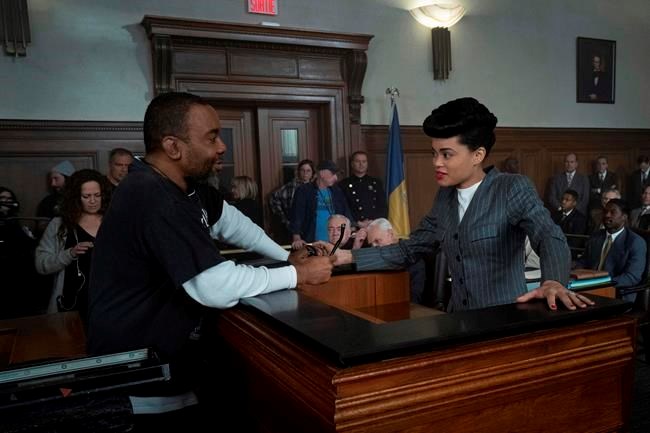Lee Daniels didnŌĆÖt want to touch the story of Billie Holiday. ŌĆ£Lady Sings the BluesŌĆØ already existed after all. The 1972 film with Diana Ross and Billy Dee Williams showed him Black romance and a Harlem like heŌĆÖd never seen on screen before. It was the film that made him want to be a director.
But it wasnŌĆÖt her full story. Holiday, heŌĆÖd come to realize, was an unsung civil rights hero who was targeted by the U.S. government for her drug use and her protest song, ŌĆ£Strange Fruit.ŌĆØ ItŌĆÖs this story thatŌĆÖs told in ŌĆ£The United States vs. Billie Holiday,ŌĆØ written by Pulitzer Prize-winning playwright Suzan-Lori Parks. The film debuts Friday on Hulu.
ŌĆ£I was like, where have I been for all these 59 years? How come I donŌĆÖt know this story when I sort of know everybodyŌĆÖs story, or I thought I did, when it comes to Black history,ŌĆØ Daniels said. ŌĆ£It made me think about the many stories that arenŌĆÖt told that we donŌĆÖt know about. And so I had to tell the story.ŌĆØ
He even called up legendary record producer Berry Gordy, who produced ŌĆ£Lady Sings the Blues,ŌĆØ to get his blessing.
ŌĆ£I just wanted to do her right,ŌĆØ Daniels said. ŌĆ£I was so terrified.ŌĆØ
Naturally the biggest challenge would be finding the right actor for Holiday. He didnŌĆÖt know what he was looking for ŌĆö should he go for a named actor? An unknown? A singer making her film debut, like Ross had 50 years ago?
At the suggestion of his manager, he met with Andra Day, who had been nominated for a Grammy but had never acted. It was something Day had been thinking about, but she figured before she did anything, sheŌĆÖd take a few years off and really learn the craft.
When she sat down with Daniels, Day told him, ŌĆ£I donŌĆÖt think I should do this.ŌĆØ
Still, they formed a connection over Billie, who sheŌĆÖd loved since age 11, and the fact that they both thought this was a ŌĆ£terrible idea.ŌĆØ Then Daniels saw a tape, filmed in secret by DayŌĆÖs acting coach, of her transforming into Holiday, and he was sold. It had to be Day.
Making the film was a challenge, though. Daniels shot on film, which ate up a large part of the budget, and he wanted to make sure to depict her world and all its glamour, so all the money they could scrape together is ŌĆ£on the screen.ŌĆØ
ŌĆ£ThereŌĆÖs a beauty of working in independent cinema because I donŌĆÖt have to answer to anybody but the actors and my crew,ŌĆØ Daniels said. "ThereŌĆÖs no outside interference from suits who donŌĆÖt know anything about our culture. It was great to just do us. Everything you see on that screen is us. ItŌĆÖs our soul.ŌĆØ
Day was grateful that the start date kept getting pushed back. She had about a year and a half to prepare, which started confusing her mother when sheŌĆÖd drift into Billie-isms in real life.
ŌĆ£M▓Ō
Getting into character turned out to be the least of her problems. Getting out of character was another story. It even alarmed Daniels.
ŌĆ£I get emotional talking about this girl because sheŌĆÖs getting ready to be mega famous after this,ŌĆØ Daniels said. ŌĆ£(But) I was terrified for her as we were as we were coming to an end. One of the last things that we shot was her singing ŌĆśAll of MeŌĆÖ and I said, itŌĆÖs time for you to release Billie. YouŌĆÖve got to sing it as Andra now...She couldnŌĆÖt do it, she could not leave Billie and she knew she let me down. So she started crying.ŌĆØ
Day did not, in fact, let Daniels down and the tears made it into the final moments of film, but the next thing he did was to book a vacation for his lead to Tulum, Mexico. He split the cost with the production.
But Day was too attached. Even after she got back, she had trouble letting Billie go and would get excited to do additional shoots, which felt like ŌĆ£purpose again.ŌĆØ
And the commitment is earning her awards buzz and a nomination at Sunday's Golden Globe Awards.
ŌĆ£ItŌĆÖs that Lee Daniels effect,ŌĆØ she laughed. The Daniels-produced ŌĆ£MonsterŌĆÖs BallŌĆØ got Halle Berry her Oscar and then ŌĆ£Precious,ŌĆØ which he directed, got a nomination for Gabourey Sidibe and a win for MoŌĆÖNique.
Daniels is still a bit heartbroken that the film wonŌĆÖt be released widely in
ŌĆ£We had that incident that just changed America and everybody went to the streets and you couldnŌĆÖt make that up,ŌĆØ he said. ŌĆ£We could have pushed it to next year. But I thought it was important to release it right now, given everything that was going down in America.ŌĆØ
As for Day? Billie is still there in some ways.
ŌĆ£IŌĆÖm still trying to navigate it,ŌĆØ Day said. ŌĆ£But IŌĆÖm not out on a cliff anymore.ŌĆØ
___
Follow AP Film Writer Lindsey Bahr on Twitter: www.twitter.com/ldbahr
Lindsey Bahr, The Associated Press



